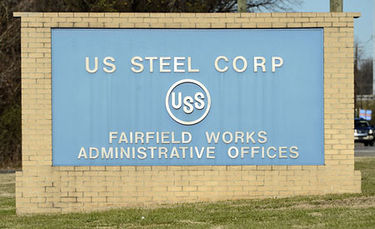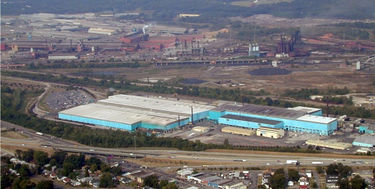Fairfield Works
The Fairfield Works is a former integrated steel mill, one of five operated by U.S. Steel of Pittsburgh, Pennsylvania. Its furnaces and fabrication facilities manufactured hot-rolled, cold-rolled and coated sheet products from raw materials.
The plant was planned and constructed by U.S. Steel's Tennessee Coal, Iron & Railroad Company (TCI) division beginning in 1909. Utilizing locally-mined resources, the plant promised to be so efficient at making cheap steel that its parent company levied an internal tariff (the 'Pittsburgh Tariff') in an effort to prevent the Birmingham product from undercutting the profitability of its Pittsburgh mills. In 1925 TCI completed the High Ore Line Railroad, providing a direct supply route from its iron ore mines at Wenonah to the furnaces in Fairfield.
At its peak during World War II, U.S. Steel employed more than 45,000 workers in the Birmingham District, mostly at the Fairfield and Ensley Works.
TCI moved its headquarters offices from the Brown-Marx Building in downtown Birmingham to the Flintridge Building overlooking the Fairfield Works in 1951, in anticipation of being absorbed as a division of the parent company in 1952.
U.S. Steel closed Fairfield Works in late 2015, idling around 1,100 workers. At the time, there were plans to construct a new electric arc furnace at the nearby Fairfield Tubular Operations plant. Those plans were tabled until 2020 due to low demand for steel tubular products.

